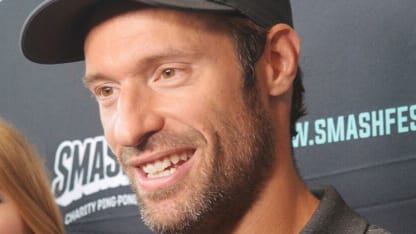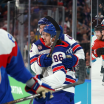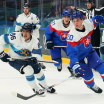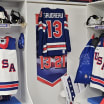There are cancers that almost everyone has heard of -- breast cancer and prostate cancer, lung cancer and leukemia -- and then there are the other cancers. The rare cancers. Like fibrolamellar hepatocellular carcinoma.
Moore embraces role as Hockey Fights Cancer ambassador
Former NHL forward seeks to raise awareness of rare cancers in tribute to first wife

That was what Katie Moore, the first wife of former NHL player Dominic Moore, was diagnosed with in 2012, and what she died from in January 2013 at 31 years old. That was what prompted Moore to start the Katie Moore Foundation in 2013, a foundation that supports awareness of and research into rare cancers, which affect one-fourth of all people diagnosed with cancer.
It was one reason why Moore was selected as the NHL Hockey Fights Cancer ambassador for 2021-22.
"I think it's important to highlight all of the different ways that cancer impacts us," Moore said from Boston, where he lives with his wife, Mary, and their 20-month-old daughter. "And I think all the ways that people are impacted by cancer, some triumph and are able to, we say beat cancer, and they should be celebrated. But others are not as lucky. And I think those people should be celebrated as well. And they're an important reminder of why we're doing this in the first place.
"I think that's a big part of the message I'd like to share and beyond that, just unite the community in and around the cause and find comfort and strength in each other. And hopefully, make some progress along the way."
RELATED: [The Chirp podcast: Moore talks Hockey Fights Cancer, Rangers' Fox]
Moore played 13 seasons in the NHL, from 2003 to 2018, for 10 teams. He sat out the 2012-13 season to care for Katie and returned to hockey in 2013-14 with the New York Rangers. He won the 2014 Bill Masterton Memorial Trophy as the player who best exemplifies the qualities of perseverance, sportsmanship and dedication to hockey.
He started the Smashfest Charity Ping-Pong Challenge in 2012 to raise money for concussion research, and it expanded to include research for rare cancers in 2013. Since then, Smashfest has only grown, raising $130,000 in 2021.
Hockey Fights Cancer, started in 1998 by the NHL and NHL Players' Association, unites hockey players to support the American Cancer Society and Canadian Cancer Society as national partners for the League-wide campaign, which has raised nearly $30 million since its inception. Donations raised through HockeyFightsCancer.com will support both organizations, providing support for people with cancer and their families. Funds go toward covering the costs of accommodations, meals, transportation and emotional support for patients who are often displaced from their homes in order to get treatments.
Moore sat down to discuss his experiences with cancer and why the role of ambassador is important to him.
What does it mean to be the Hockey Fights Cancer ambassador?
"It's an honor to serve in the role of the ambassador this year. It's a program that obviously feels extremely valuable and important, and I have a lot of passion for this cause. So to be asked to be the ambassador is an honor. The hockey community has been incredible, not only with Hockey Fights Cancer in all the 23 years that that's been going on and the way people have rallied together around that, but I've seen firsthand the way the hockey community supports each other around my event, Smashfest, and the way that that's been supported by players and by the [NHL Players' Association] and by the League and by fans. It's a small world, the hockey world, and Hockey Fights Cancer is a great showcase of how supportive that world is when they work together and rally around a cause."
Tell me about the Katie Moore Foundation, which you started in 2013.
"[I] founded the Katie Moore Foundation in honor of my late wife, Katie, who passed away from a rare liver cancer called Fibrolamellar Hepatocellular Carcinoma. We wanted to do something for rare cancers in Katie's memory. She passed away of this rare liver cancer, but there's a lot of rare cancers out there that collectively make up a huge portion of cancer patients. Over a quarter of cancer diagnoses are rare cancers. It's a very different outlook for those patients in terms of the treatability, the research and the prognosis. We can be thankful that we've made so much progress for common cancers, like breast cancer. It's an amazing thing that we should all be proud of. But for the rare cancers, they're lagging behind. And so we wanted to do our best to drive awareness and support for that. And so that's what we've done with Smashfest, and with the Katie Moore Foundation."
How did you come up with the idea for Smashfest, and how has it evolved?
"I'd always loved playing table tennis in the locker room. Almost every team in the League has a table. And I've been in almost every locker room in the League as a player for many teams. But always loved to battle and play with the guys. Marty St. Louis was my big rival in Tampa. And we played a lot. There's a lot of guys on the team in Tampa that played and trash-talked each other and whatnot. And I just always thought it would make for an amazing charity event to kind of showcase the players' personalities. And no matter what level you play ping-pong, it's fun. So just had the idea to try it. And at the time, it was pretty unique. We see a lot more table tennis events now, but at the time it was pretty unusual, and we didn't know what to expect. With the support of the PA, we got it off the ground and got it going. And the feedback was outstanding after the first year and more and more partners got involved over the years, and it's just continued to grow. So just thankful for the way it's continued to go."
How have you felt the embrace of the hockey community with Smashfest?
"We have 20-plus players every year at Smashfest, and it's a testament to the character and generosity of the players. They've got busy summers and have a lot of things on the go and training and whatnot, and they take time to come out and be there. It's truly special and a testament to the support, the camaraderie and just the quality of people that exist in this community."
What is important for people to know about rare cancers?
"I think the biggest thing to know about rare cancers is simply that the rare cancers are a very different prognosis. A lot of times patients that get sick, they have no idea what's going on, they have a hard time finding a diagnosis. And then after that, finding the right treatment, if any treatment even does exist. So a big part of it is awareness. A big part of it is giving rare cancer patients somewhere to turn for help. And so what we've tried to do with the Katie Moore Foundation is create a platform that can take some small but incremental steps towards progress for that. We have a program that allows cancer patients to donate their tissue for research and all of that goes to a centralized lab called the Broad Institute that's affiliated with MIT and Harvard. And they create meaningful data that they can then share with the world. So it's a great program that we're very proud of."
What is Katie's story?
"She passed away at 31. She got sick kind of out of the blue and it was discovered that she had this rare liver cancer. I took a year off from hockey at the time to be there with her and to care for her through her treatments and whatnot. And so, obviously, she's had a big impact on my life, and what I've continued to try to do with the foundation. And there's been a lot of people that have supported me through that. And so I'm grateful for that, and hope to continue to, again, make some incremental impact here.
"One of the things I think with cancer patients, and for those people out there that have been impacted know [that] one of the most important principles is you just have to take things one day at a time. That's what I constantly reminded Katie when she was going through her treatments, and when I see cancer patients now, it's something that I try to keep them in the present. All you can do is that, and I think that's what we're doing on all fronts, including what we're trying to do in making an impact and find cures. It's just one day at a time."
What is your ultimate message about Hockey Fights Cancer?
"Cancer touches so many of us. Essentially all of us have had someone, ourselves, someone close to us [affected by cancer]. And so I think it's a really powerful way for us to share that experience. And Hockey Fights Cancer is a great initiative in that way."
















